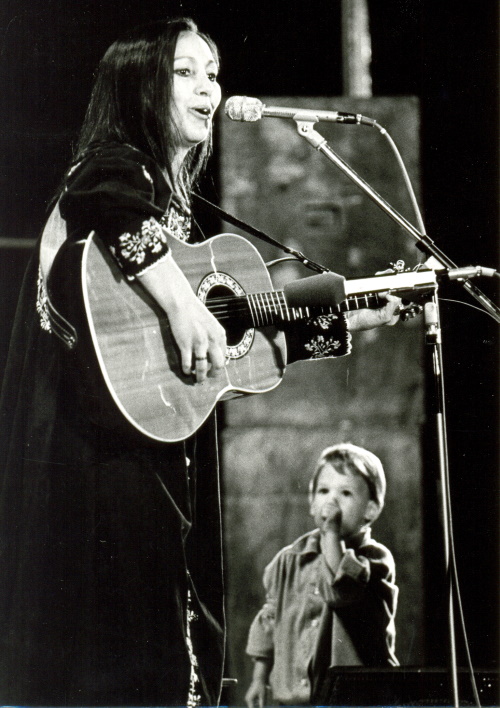Shindig! Archive: Julie Felix
JON ‘MOJO’ MILLS talked to the late JULIE FELIX, who was then 80 years young, as she released her 22nd studio album Rock Me Goddess. Beatniks, Trump, Donovan and The Incredible String Band, and the Me Too movement all crop up, proving that this strong Bohemian lady had lost none of the fire that inspired her musical adventures for over half a century.

Shindig!: What was it exactly that first brought you to the UK 56 years ago? And what was it that kept you from returning to California?
Julie Felix: I left California in 1962 after I graduated from UCSB. I travelled to Europe because I felt isolated in California and wanted to “see some of the world”. I had read Jack Kerouac’s On The Road and was inspired to travel. I went first to Greece I didn’t come to England until ’63. When I run out of money I started singing in cafes and restaurants etc in Spain and Germany. I didn’t return to California because I didn’t want to. I wanted to keep on travelling and following the adventure.
SD!: What made you travel to the Greek island of Hydra? You met Leonard Cohen there, what was he like in those days before he became famous?
JF: I took a boat from New York to Patras in Greece and then travelled with a friend of mine to Hydra because she had a brother who lived there. It was there I met Leonard [Cohen]. He was writing his first novel and didn’t plan to be a singer. He would borrow my guitar that my father gave me when I left the States, and he would play union songs. We hung out together until I left the island. Met up later in Paris and didn’t see him again until after he made his first album and he came to England to be on my TV show. I think it was 1967.
SD!: You were part of The Frost Report, one of the great things to come out of the British satire boom of the ’60s. Was there ever a chance you would follow the path taken by future members of Python?
JF: No, I didn’t think about going into satire, but I really loved what John Cleese and the rest of them did on Monty Python, I thought it was brilliant.
SD!: How did your BBC show come about? Did you ever come across fellow American Bobbie Gentry when you both had shows? Did you discuss England and back home?
JF: Yes, it all came about after I did The Frost Report and used to warm up the audience before they started the show. Billy Cotton Junior apparently liked what I was doing and that led to him offering me my own show. It would be the first colour series on the newly established BBC2 headed by David Attenborough. David Frost was very helpful in starting my new series. Bobbie Gentry was not on my show but I met her briefly when Stanley was producing her half hour show.
SD!: John Cameron came in as your producer in 1967, and also worked with Donovan around that time. How big a difference did he make to your sound?
JF: I guess it was about ’66 that I recorded the Donovan song ‘Saturday Night’. He wanted John Cameron to arrange the music and that was when I first met John. Stanley Dorfman (see Shindig! #82) and I decided that John would be a great musical arranger for the series. I couldn’t read music but John taught me to read chord charts. We worked with the 28-piece orchestra and it was incredible how John led them to follow my music. John also came with me to do to shows in Germany and then in Yugoslavia. He also worked on a few albums with me when I was on Fontana. He actually did the arrangement with me on ‘Over The Sea’, one of the tracks on my new album Rock Me Goddess. Also, he joined me in June at The Charing Cross Theatre to celebrate my 80th birthday. He lives near me, and we get together often.
SD!: Donovan or Dylan?
JF: I enjoyed singing songs by Donovan and other singer-songwriters, but it’s Dylan songs that I really love to sing. Perhaps it’s because we are both Geminis. I recorded a double album of Dylan songs called Starry Eyed And Laughing [with] contributions from John Paul Jones, Kiki Dee and Danny Thompson.
SD!: You invited The Incredible String Band onto your UK TV show in 1968. Were you a fan of theirs? What were your thoughts on the underground psychedelic folk boom that followed?
JF: I met The Incredible String Band through my friend Joe Boyd. I was really blown away by the music they were making. It was wonderful having them on my show and singing ‘Painting Box’ together. I think they offered something very unique to the folk scene and I did like the way the so-called psychedelic folk pool as you call it brought more poetry and imagination to the folk scene of the ’60s.
SD!: Apparently they had a falling out with Stanley Dorfman, which meant they weren’t invited back again – any recollection of this?
JF: I don’t remember anything about Stanley Dorfman falling out with Robin and Mike, but I know they fell out with each other, which is a great shame. I don’t see a lot of them but when I do meet up with them it’s great to reconnect.
SD!: After starring in your own TV show many considered you to be a “safe”, “establishment” singer; by the early ’70s some considered you to be an “all-round entertainer”. Were you comfortable with this image or did you want to break out of it?
JF: The kind of “girl next door” image that the BBC branded me with did not feel particularly comfortable. And the success of ‘Going To The Zoo’ didn’t help. One must remember the difficult role women played in the music of the ’60s. There were hardly any women over here playing guitars, and the music industry was totally dominated by men. This made it difficult to find a comfortable “image”.
SD!: Did the 1968 drug bust alter the rather stuffy BBC’s opinion of you? Were words exchanged?
JF: I was on my way to celebrate the success of The Frost Report in Switzerland when I was busted at Heathrow airport. The BBC didn’t cancel my series but when it finished (the third year) they didn’t renew it either.
SD!: You did a great cover of Donovan’s ‘Snakeskin’. What led to this?
JF: Mickie was looking for a material for me to record for a single. He had a few words in the roof that Don had written and gave it to me. I wrote a few words and he and I put together a song from the parts that Don had given us. Because of my involvement with putting the song together I really enjoyed singing it. I even had a whole outfit made out of ‘Snakeskin’… including boots!
SD!: What are your main memories of performing at the 1969 Isle Of Wight Festival?
JF: I remember The Isle Of Wight and looking out at the audience of people that stretched out farther than I could see. I remember being blown away by seeing The Beatles in the audience. But my most treasured memory is being backstage sitting on the grass while The Band was playing. Dylan came out of his caravan and came and sat beside me and we talked for about half an hour. He was getting nervous because the whole show was running so very late. When he finally got on stage he took me up and had me sit at the back of the stage with his manager. I watched his whole set from there and it was magical. I was supposed to go to the party afterwards but had to get a plane to Gibraltar where I was doing some filming the next day.
SD!: Do you agree with the directions in which producer Mickie Most steered your music? Did you have much say in the singles/album tracks you released?
JF: It was great working with Mickie Most. Before Mickie I was never allowed to be in on the production and in the engineering room. I really learned about record producing from Mickie and when I was going for my own company Remarkable Records I drew upon all the experience I had gathered from working with him. He involved me in the choice of material and the mixing of the tracks. He too was a Gemini.

SD!: Being an original beatnik and later a hippie, how did you find the change of outlooks and fashion in the music industry, and society as a whole?
JF: My friend and I became beatniks when I was a senior at university. I think a lot of us were influenced by Jack Kerouac. And then Ginsberg and The Beat Poets. We just didn’t like the establishment and tried to find a way of living outside of it. When the hippies came along in the mid-60s it was kind of an extension of this, but with bells and beads and flowers in your hair. It was more colourful. I still think the music industry was dominated by men and so it was not that liberating for women. But it was a lot of fun and a chance for many people to break out of moulds that were so restraining. I think this was particularly true in England because of the class system. It was the time when creative people got ahead of the so-called establishment.
SD!: After a couple of hits on RAK in 1970 you ventured into electric rock in the mid-70s. Very different from how you first became known: was this something you’d have liked to have done earlier?
JF: It’s hard to define exactly what kind of music I write and record. Certain songs call out for different kinds of instrumentation. In concert I usually work alone but when I’m in the studio I love to paint the lyrics and feelings by introducing different instruments and sounds. On my album Rock Me Goddess the song ‘Tiger Eyes’ is quite heavy rock but there are gentle songs as well like ‘The Heron’ and ‘Lullaby Kiss’. Folk music almost always tells a story and this separates it from pop music. Even when Dylan went electric his songs still told a story. When telling the story, it’s fun and creative to use different instrumentation. Including bass and drums.
SD!: Your last album for a major label was in 1974 – Lightning on EMI. Did things change dramatically once you were an independent artist and, if so, in what ways?
JF: I left EMI because I felt a lack of personal involvement. I wanted to make my own kind of music established through my record company Remarkable Records. I preferred to work on my own but recently when I met Malcom from Talking Elephant I decided to release my new album Rock Me Goddess on his label.
SD!: What triggered the move to Scandinavia in the late ’70s?
JF: I moved to Norway in the late ’70s because I was in a relationship with a Norwegian. I also had a #1 hit record in Norway and enjoyed working in that country.
SD!: At one of your shows earlier in the year (Hull Adelphi), you talked eloquently about the downsides for women of living in a patriarchy. Would love to hear more of your thoughts on that and do you envisage this situation changing?
JF: I hope you have had a chance to listen to my new album. There’s a track on there called ‘Woman’ that touches upon the “Me Too” and “TMES UP” movement. Patriarchy is a destructive system responsible for the disastrous situation the world is in today. It enslaves women and forces men to fight so that they can win. Men are required by their fathers and by society to be strong and successful even if it means killing his brother. This of course is a generalisation, but if women could be equal this would benefit all of humankind. Men continue to rape women and rich and powerful men continue to rape the planet. This is a huge topic and I’m afraid I can’t cover it in this context.
SD!: As someone of mixed Mexican and Native American heritage what are your thoughts on America’s current stance on immigration?
JF: What Donald Trump is doing in America is despicable and dangerous. Consider what the Europeans did to the Native Americans. And now look at how Trump is treating the Mexicans. It seems like we are going backwards instead of forward.
SD!: Throughout your career you’ve done anti-war songs, promoted women’s rights and gay rights. But where are we heading now? How do we stay optimistic for the future?
JF: With Donald Trump tearing up the treaty with Iran, with England selling weapons of destruction to Saudi Arabia, with fracking taking place in Lancashire it’s hard to be optimistic. But I refuse to be pessimistic. To quote from one of my songs, ‘Freedom Is A Woman’: “So come, let’s sing these songs of freedom / Let’s find the strength to take a stand / We’ll sing of peace and understanding / And let it ring throughout the land.” And from my song ‘Peace Is A River’: “Peace is a river and it’s flowing / Peace is a river and it’s growing / It’s running through the mountains, headed toward the sea / It’s a piece on you and it’s a piece in me / that will one day set us free. Oh yes, it will, it will one-day set us free.”
Rock Me Goddess is out now on Talking Elephant
Thanks to Andy Morten, Charles Donovan, Hugh Dellar, Adrian Whittaker, Duncan Fletcher, Phil Suggitt and Simon Matthews.

